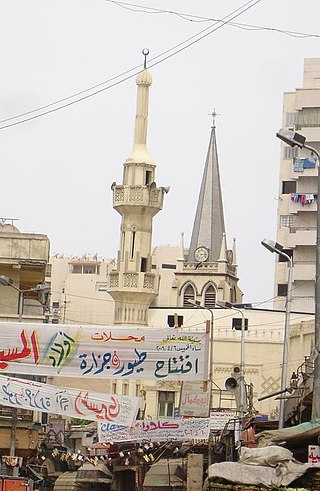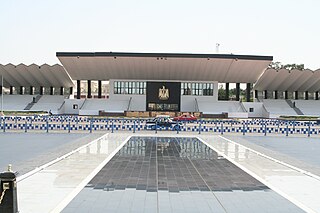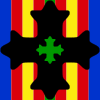
The Coptic Orthodox Church,, also known as the Coptic Orthodox Patriarchate of Alexandria, is an Oriental Orthodox Christian church based in Egypt. The head of the church and the See of Alexandria is the pope of Alexandria on the Holy Apostolic See of Saint Mark, who also carries the title of Father of fathers, Shepherd of shepherds, Ecumenical Judge and the 13th among the Apostles. The See of Alexandria is titular. The Coptic pope presides from Saint Mark's Coptic Orthodox Cathedral in the Abbassia District in Cairo. The church follows the Coptic Rite for its liturgy, prayer and devotional patrimony. Adherents of the Coptic Orthodox Church make up Egypt's largest and most significant minority population, and the largest population of Christians in the Middle East and North Africa (MENA). They make up the largest percentage of approximately 20 million Christians in Egypt

Nag Hammadi is a city and markaz in Upper Egypt. It is located on the west bank of the Nile in the Qena Governorate, about 80 kilometres (50 mi) north-west of Luxor. The city had a population of close to 61,737 as of 2023.

Pope Shenouda III was the 117th Pope of Alexandria and Patriarch of the See of St. Mark. His papacy lasted 40 years, 4 months, and 4 days, from 14 November 1971 until his death.

Copts are a Christian ethnoreligious group indigenous to North Africa who have primarily inhabited the area of modern Egypt since antiquity. They are the largest Christian denomination in Egypt and the Middle East, as well as in Sudan and Libya. Copts in Egypt account for roughly 5–15 percent of the Egyptian population; Copts in Sudan account for 1 percent of the Sudanese population, while Copts in Libya similarly account for 1 percent of the Libyan population.
Persecution of Christians in the post–Cold War era refers to the persecution of Christians from 1989 to the present. Part of a global problem of religious persecution, persecution of Christians in this era is taking place in Africa, the Americas, Europe, Asia and Middle East.

Religion in Egypt controls many aspects of social life and is endorsed by law. The state religion of Egypt is Islam, although estimates vary greatly in the absence of official statistics. Since the 2006 census religion has been excluded, and thus available statistics are estimates made by religious and non-governmental agencies. The country is majority Sunni Muslim, with the next largest religious group being Coptic Orthodox Christians. The exact numbers are subject to controversy, with Christians alleging that they have been systemically under-counted in existing censuses.

Terrorism in Egypt in the 20th and 21st centuries has targeted the Egyptian government officials, Egyptian police and Egyptian army members, tourists, Sufi Mosques and the Christian minority. Many attacks have been linked to Islamic extremism, and terrorism increased in the 1990s when the Islamist movement al-Gama'a al-Islamiyya targeted high-level political leaders and killed hundreds – including civilians – in its pursuit of implementing traditional Sharia law in Egypt.

Christianity is the second largest religion in Egypt. The vast majority of Egyptian Christians are Copts. As of 2019, Copts in Egypt make up approximately 10 percent of the nation's population, with an estimated population of 9.5 million or 10 million. In 2018, approximately 90% of Egyptian Christians were Coptic Orthodox.

The persecution of Copts and discrimination against Coptic Orthodox Christians are historic and widespread issues in Egypt. Their treatment is indicative of the poor status of Christians in the Middle East more widely, despite the fact that the religion is native to the Middle East, and that Christianity in Egypt dates back to the Roman era. Copts are the indigenous Christians in Egypt, usually Oriental Orthodox, who currently make up 10% of the population—the largest religious minority of that country. Copts have cited instances of persecution throughout their history and Human Rights Watch has noted "growing religious intolerance" and sectarian violence against Coptic Christians in recent years, as well as a failure by the Egyptian government to effectively investigate properly and prosecute those responsible. However, as political violence is common many churches believe that the attacks against the church are not religious statements, instead political statements. Since 2011, hundreds of Egyptian Copts have been killed in sectarian clashes, and many homes, churches and businesses have been destroyed. In just one province (Minya), 77 cases of sectarian attacks on Copts between 2011 and 2016 have been documented by the Egyptian Initiative for Personal Rights. The abduction and disappearance of Coptic Christian women and girls also remains a serious ongoing problem.
Twenty-one Coptic Christians were the victims of a massacre in Kosheh, Upper Egypt, located 450 kilometres south of Cairo, on Sunday, 2 January 2000. The Coptic Christians killed in this incident were considered martyrs of the Coptic Orthodox Church by Pope Shenouda III.

In the 2010 Baghdad church massacre, six suicide bombers of the Islamic State of Iraq (ISI) militant group attacked a Syriac Catholic church in Baghdad during Sunday evening Mass, on 31 October, 2010, and began killing the worshipers. ISI was a militant group which aimed to overthrow the Iraqi federal government and establish an Islamic state in Iraq.
The 2011 Alexandria bombing was an attack on Coptic Christians in Alexandria, Egypt, on Saturday, 1 January 2011. 23 people died and another 97 were injured as a result of the attack, which occurred as Christian worshipers were leaving a New Year service. The attack was the deadliest act of violence against Egypt's Coptic Christians in a decade, since the Kosheh massacre in 2000 left 20 Copts dead. The target of the bombing was the Saints Church, a Coptic church located across the street from the Masjid Sharq El-Madina mosque.
The 2011 Imbaba church attacks were a series of attacks that took place in Egypt on 7 May 2011 against Coptic Christian churches in the poor working-class neighborhood of Imbaba in Giza, near Cairo. The attacks were blamed on Salafi Muslims, and the attacks began when the Muslims attacked the Coptic Orthodox church of Saint Mina, where they alleged a Christian woman was being held against her will because she wanted to convert to Islam. The attacks resulted in the burning of 3 Coptic Orthodox churches, and the destruction of many Christian-owned houses and businesses. In addition, 15 people were killed in the attacks, and about 232 injured. Among those killed were four Christians and six Muslims, while two other bodies were still unidentified. Imbaba has been known to be a stronghold of Muslim fundamentalists since the 1970s, but also comprises a significant number of Coptic Christians.

The Maspero Massacre initially started as demonstrations in October 2011 by a group dominated by Egyptian Copts in reaction to the demolition of a church in Upper Egypt claimed to be built without the appropriate license. The peaceful protesters who intended to stage a sit-in in front of the Maspiro television building were attacked by security forces and the army, resulting in 24 deaths, mostly among the Coptic protestors, and 212 injuries, most of which were sustained by Copts.
Copts in Egypt refers to Coptic Christians born in or residing in Egypt.

On 11 December 2016, a suicide bomber killed 189 people and injured 400+ others at St. Peter and St. Paul's Church, a chapel next to Saint Mark's Coptic Orthodox Cathedral, seat of the Coptic Orthodox Pope, in Cairo's Abbasia district. Egypt's President, Abdel Fattah el-Sisi identified the bomber as 22-year-old Mahmoud Shafiq Mohammed Mustafa, who had worn a suicide vest. el-Sisi reported that three men and a woman have been arrested in connection with the attack; two others are being sought. ISIS claimed responsibility for the attack.
On Palm Sunday, 9 April 2017, twin suicide bombings took place at St. George's Church in the northern Egyptian city of Tanta on the Nile delta, and Saint Mark's Coptic Orthodox Cathedral, the principal church in Alexandria, seat of the Coptic papacy. At least 44 people were reported killed and 100 injured. The attacks were carried out by a security detachment of ISIS.
On 26 May 2017, masked gunmen opened fire on a convoy carrying Copts from Maghagha in Egypt's Minya Governorate to the Monastery of Saint Samuel the Confessor, killing at least 33 people and injuring 22 others.
On 29 December 2017, in Helwan, Cairo, Egypt, a gunman opened fire at the Coptic Orthodox Church of Saint Menas and a nearby shop owned by a Coptic man, killing ten citizens and a police officer and injuring around ten people. He was wounded by police and arrested. Investigators said he had carried out several attacks in the last year. Later, Amaq News Agency described that terrorist attack was carried out by a person belonging to the Islamic State group.
On 2 November 2018, masked gunmen opened fire on a group of Egyptian Christians travelling by bus through Minya. There was a convoy of three vehicles and two of them managed to escape. The vehicles were carrying Copts traveling from Sohag Governorate and Minya Governorate in Egypt to the Monastery of Saint Samuel the Confessor. At least 7 people from Minya were killed while 12 others were injured. A similar attack near the same place had happened in 2017.











